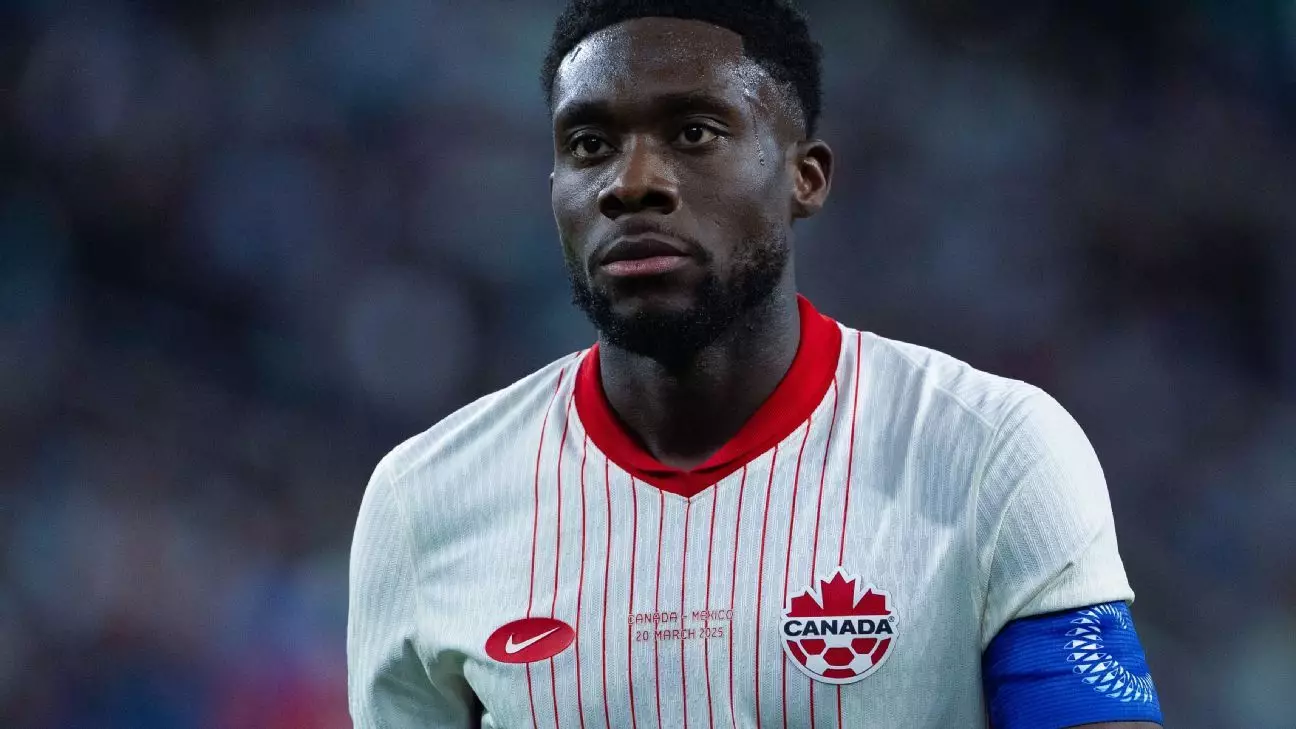Recent events in the world of Canadian soccer have left many questioning the protocols surrounding player safety and the responsibilities of national federations. Alphonso Davies, a shining star and key player for Canada and Bayern Munich, suffered a devastating injury during the Concacaf Nations League finals. The left-back, renowned for his exceptional speed and skill, tore his anterior cruciate ligament and faced additional damage to his knee during a hard-fought match against the United States. Following the injury, Bayern Munich’s response, which included threats of legal action against Canada Soccer, raised eyebrows and pointed to potential mismanagement by the Canadian soccer authorities.
Injuries of this magnitude are not only a physical setback for players but can also impact their mental fortitude. For Davies, who has worked tirelessly to establish himself as one of the best young soccer talents worldwide, the ramifications of this injury extend beyond his immediate health. It dramatically alters the trajectory of his season and may affect his long-term career prospects. Bayern’s swift reaction, which included allegations of inadequate medical care from Canadian officials, puts the spotlight on the responsibilities of national teams when it comes to the welfare of their players.
A Clash of Perspectives: The Bayern Munich Response
Bayern’s frustration is palpable, stemming from concerns that Canada Soccer may have neglected proper protocols during and after the tournament. The club’s chief executive, Jan-Christian Dreesen, expressed grave disappointment by labeling the actions surrounding Davies’ injury as a “gross negligence” that disregarded a player’s health. The notion that Davies was allowed to endure a 12-hour flight without an in-depth medical assessment is troubling. While it’s not uncommon for athletes to feel pressure to play through injuries, it remains the responsibility of medical staff to prioritize player safety above all else.
The call for a thorough investigation by Bayern underlines the seriousness of their claims. It is reasonable to argue that player well-being should be non-negotiable. No player should be put at risk without comprehensive medical evaluation, and players are entitled to the highest standard of care, especially at such critical junctures in their careers. Such stances raise crucial questions about the overarching culture of player health management in competitive sports, particularly within national teams tasked with representing their countries.
Canada Soccer’s Defense: A Stand for Protocols
In response, Canada Soccer has defended its actions vigorously. It contended that it adhered strictly to medical protocols and maintained constant communication with Bayern Munich regarding Davies’ condition throughout the tournament. This assertion presents a compelling narrative that Canadian officials were not neglectful but rather faced unfortunate circumstances that ultimately led to the injury. Canada’s medical staff indicated that they used appropriate protocols during the entire tournament, suggesting that all necessary measures were in place to ensure players’ health.
However, the friction between Bayern Munich and Canada Soccer raises an essential issue — even if protocols were observed, could improvements be made? The dialogue prompted by this incident could lead to a critical evolution in how federations handle injuries. Simple adherence to protocols might not be enough when it comes to elite athletes like Davies, who risk long-term consequences if their injuries are not managed correctly.
Lessons in Communication: Bridging the Gap Between Teams
A significant aspect of this situation centers around communication — not just between clubs and national teams but also involving players and their representatives. The player’s agent, initially critical of Canada’s handling of Davies’ situation, expressed a shift towards a more collaborative approach after discussions with the Canadian coach, Jesse Marsch. This change in tone underscores the necessity for ongoing dialogue between all parties involved, ensuring that players’ best interests are at the forefront.
While misunderstandings can arise in high-stakes environments like professional sports, it seems imperative to develop a foundation of trust built on transparency and empathy. Strengthening the relationship between clubs and national teams, particularly in matters of player health, could pave the way for more aggressive preventive measures against injuries and ultimately improve the overall landscape of player care in soccer.
Moving Forward: A Call for Reform
The unfortunate case of Alphonso Davies serves as a catalyst for much-needed discussions regarding injury management and player safety within the realm of international soccer. While there might be valid points on either side, the consolidation of player health protocols, communication improvements, and accountability measures are more critical than ever. This incident has the potential to inspire changes that could benefit not only current players but also future generations navigating the demanding world of professional sports. The evolving narrative calls for shared responsibility, inspiring conversations, and ultimately, a stronger framework to protect the athletes who dedicate their lives to this beautiful game.

